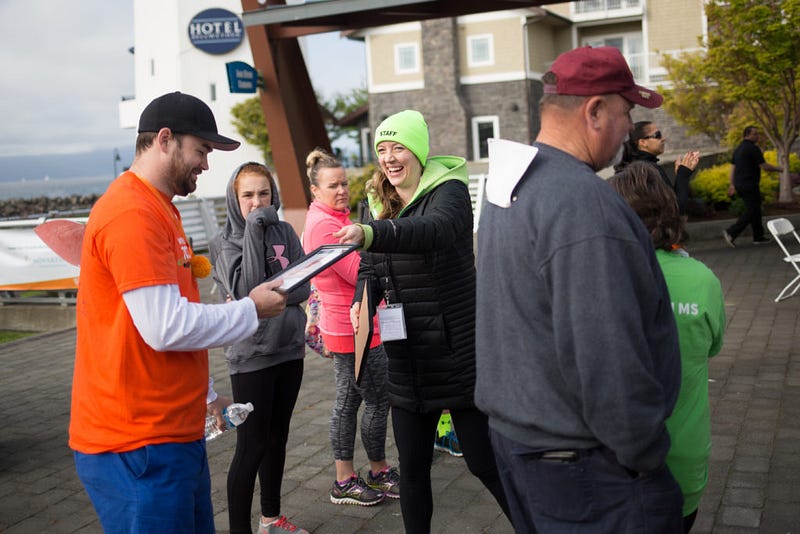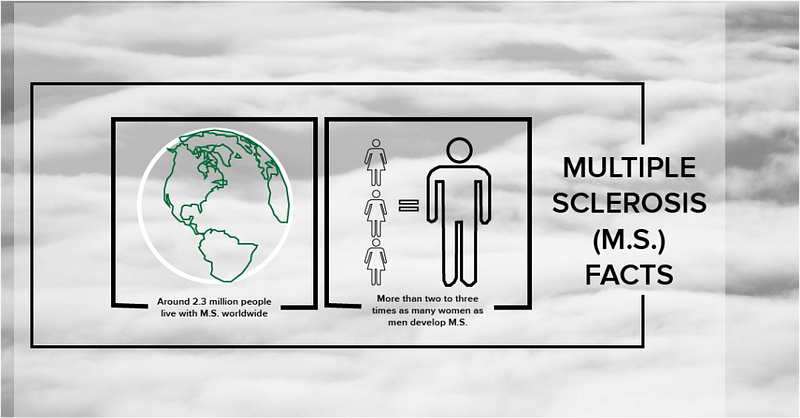Walking for Jessica
Inspired by her sister’s illness, Western student Andrea Entz raises awareness and support for the National MS Society
STORY BY ARIANA HOYER | PHOTOS BY NICK DANIELSON | INFOGRAPHIC BY HANNAH AMUNDSON
(Above) Participants of Walk MS: Bellingham 2016 begin the walk from Hotel Bellwether to Zuanich Park around the Bellingham Marina on Saturday, April 9th.
Sitting in the Underground Coffeehouse sipping an Italian soda before class, Western sophomore Andrea Entz contemplates how difficult it would be to navigate the coffeehouse in a wheelchair.
Andrea’s older sister, Jessica, was diagnosed with multiple sclerosis (MS) 15 years ago and is unable to walk without support, reliant upon a walker or wheelchair. When diagnosed at age 15, she played soccer, but now it’s a struggle to stumble across the living room. When Andrea lived in Buckley, Washington with her family, she did all she could to help Jessica through the debilitating disease. Though Jessica is 10 years older, Andrea has never felt like the younger sister.
“I was raised ‘You take care of your sister,’ and that was it,” Andrea says. “That’s why I did sports, that’s why I got strong. I always thought if there was a fire, I would be the one that has to get her out. That was my worry.”
MS is a chronic, unpredictable disease where the immune system incorrectly attacks healthy tissue within the central nervous system. MS affects more than 2.3 million people worldwide, including 15,000 patients in the Pacific Northwest, according to the National MS Society. Though not usually fatal, MS often lowers life expectancy by about seven years. Most patients are diagnosed between the ages of 20 and 50.
Jessica, 30, graduated with a degree in sociology from Central Washington University in 2009 but moved home after graduation to get the care she needs. Her illness forced her to abandon her dreams of doing social work with high school students. Instead, she spends her days watching Ellen, volunteering with the Buckley Youth Center board and spending time with her three teenage stepsisters. She misses her independence and often feels isolated at home.
Jessica is recovering from a relapse that paralyzed the left side of her body and left her hospitalized. She requires assistance for basic tasks, as she can only stand for short periods of time. Andrea sometimes has to help her bathe. She felt guilty when she went to college, leaving behind her father and stepmother to help Jessica.
“I felt like if I wasn’t at home, she wouldn’t be taken care of, in the way that I was a female for her,” Andrea says.
When Andrea talks about her sister, she smiles fondly. She speaks passionately about her childhood experiences, but laughter comes easily and often.
Though Andrea lives a few hours away, she shows her support for her sister through Walk MS, an annual nationwide fundraiser. Participants walk as a team to raise money and awareness for the National MS Society. The funds raised benefit research to find a cure to MS and a variety of resources provided by the society, including educational programs, scholarships and support for patients.
Last year, Andrea and a group of about 40 students from Mathes Hall fundraised for her 10th Walk MS. She spoke at multiple galas and fundraisers for the National MS Society. This year, 47 students from Mathes and Nash Halls raised $1,435 of the $47,187 raised by the Bellingham Walk MS. Andrea hopes her work with Walk MS will fund research to one day enable her sister to regain the independence MS stole from her.

During her junior year of high school, in 2013, her father, Herb, was diagnosed with colon cancer, and shortly later, a mild form of MS. He had radiation and chemotherapy treatments, worked two jobs as a youth drug counselor and rarely took a day off. Andrea and her stepmother stepped up to care for the family. His cancer is now in remission, but MS is here to stay.
Herb’s MS surprised but didn’t scare Andrea. She was more focused on whether his cancer would allow him to be at the upcoming milestones in her life.
“One day my dad and I were doing dishes together and I had said something about graduation and he started crying and I could hear him in his room just sobbing,” Andrea says. “I realized that he was thinking that there was a possibility that he might not be there.”
In high school, Andrea would spend long days at school with theater, ASB and sports, then come home late to do homework and help Jessica. It wasn’t until college that she started getting a healthy amount of sleep, she says with a laugh.
After Jessica and Herb were diagnosed with MS, Andrea realized that because of the genetic predisposition to MS, there was a higher possibility that she might be diagnosed with it. Andrea tries to keep moving forward until MS potentially starts bringing her down.
One day Andrea hopes to get a job that will enable her to give Jessica a place where she has the opportunity to be herself. Andrea is pursuing secondary education with a double endorsement in English and theater, in hopes of becoming a high school English teacher. She wants to use her experiences with Jessica to help high schoolers understand that everyone has a unique story.

Andrea and her family try to maintain a positive outlook and find humor in their day-to-day experiences. They laugh when they can, making light of the difficult situations they find themselves in. A favorite source of humor is teasing Jessica for being the shortest in a tall family. Andrea jokes that the height difference is perfect so she can easily support Jessica when they walk. Since Andrea started working more with the MS Society, Jessica and her family have had a more positive outlook on her disease.
“We are not the kind of family who ever asks why something happens to us,” Andrea says. “We are the kind of family who accepts what we have and we continue and we love people along the way.”
As Andrea rushes out of the coffeehouse to run across campus for the class she’s late for, she never forgets her sister. She walks because Jessica can’t.